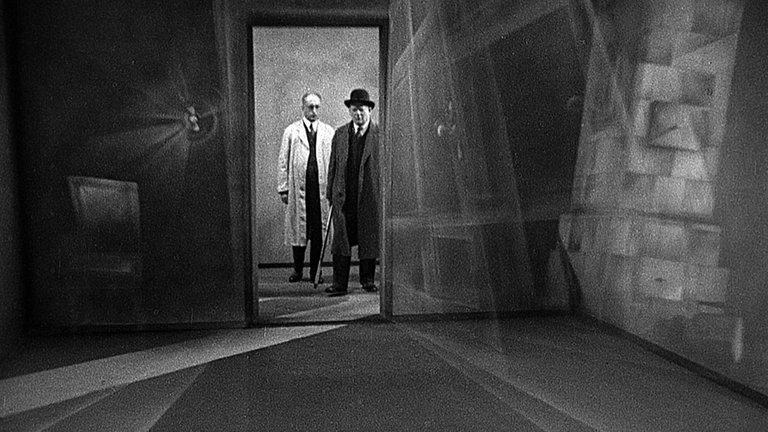Film Review: The Testament of Dr. Mabuse (Das Testament des Dr. Mabuse, 1933)

Fritz Lang's cinematic genius is undeniable, as evidenced not only by his many acclaimed films, but also by his creation of one of the first long-running film series in cinema history. The saga began with his 1922 silent classic Dr. Mabuse the Gambler, and was followed in 1933 by the sound sequel The Testament of Dr. Mabuse. This latter film also serves as a sequel to Lang's 1931 masterpiece M, making it one of the earliest major crossover events in the annals of cinema.
The plot picks up the story of Dr. Mabuse (played by Rudolf Klein-Rogge), criminal mastermind first introduced in the silent film. Ten years later he is confined to an asylum, but malevolent influence lives on through his writings, which are discovered by the asylum's director, Dr. Baum (played by Oscar Beregi Sr.). Baum becomes possessed by Mabuse's ideas and begins carrying out his plans of terror and destruction, orchestrating a vast criminal empire from behind the asylum's walls. The man who would ultimately confront it is police inspector Lohmann (played by Otto Wernicke) who would get unexpected ally in form of Thomas Kent (played by Gustav Diessl), member of Baum/Mabuse organisation who would develop second thoughts about his life of crime.
The film was produced at the very end of the Weimar Republic, just as the Nazis were coming to power in Germany. There is much debate surrounding the circumstances of the film's creation and release. Some argue that propaganda minister Joseph Goebbels, who had admired Lang's earlier work Metropolis, offered to overlook the director's Jewish background if he would work as film propagandist for the Nazi regime. What is certain, however, is that Goebbels ultimately banned the film, forcing Lang to premiere it in Hungary instead and leading the director to flee Germany for France and, later, Hollywood. Goebbels' decision to censor The Testament of Dr. Mabuse, ironically, helped cement the film's anti-fascist and anti-Nazi credentials. The story of a criminal mastermind manipulating the masses through fear and chaos was widely interpreted as a prophetic warning about the tactics of the rising Nazi party. In this sense, the film's political commentary proved to be remarkably prescient.
Viewed outside of its political context, The Testament of Dr. Mabuse stands as a solid, if not entirely flawless, entry in the Dr. Mabuse saga. Compared to its silent predecessor, the film benefits from the addition of sound, which allows Lang to experiment with chilling sound effects and a disorienting, hallucinatory atmosphere. However, it falls short of the brilliance of M, with a somewhat chaotic script and a melodramatic ending that fails to fully capitalize on the film's strengths.
One of the more disappointing aspects of The Testament is the diminished role of the iconic Dr. Mabuse himself. Reduced to a pathetic mental wreck, the character seems more like a ghost in the villain's hallucination than the formidable criminal mastermind of the silent classic. Lang himself later acknowledged that the film might have worked better without this element.
That said, the film still boasts an inspired cast, with standout performances from Karl Meixner as the insane former detective and Otto Wernicke as the dependable, cynical Inspector Lohmann, repeating his role from M. The subplot involving the Thomas Kent, and his romance with the kind-hearted Lilli, while somewhat overly idealized, is elevated by Gustav Diessl's energetic turn as Kent.
The legacy of the Dr. Mabuse saga continued long after the release of The Testament. After being shown in various other countries, it was finally shown to German audiences in 1951. This exposure left a strong impression on the young producer Artur Brauner, who would go on to become one of the most influential figures in West German cinema. Brauner later lured Lang back to Germany, where the director made the 1960 sequel The Thousand Eyes of Dr. Mabuse, which would be become his last directorial effort. The film inspired four more films in the series, including a 1962 direct remake of the 1933 classic.
Ultimately, The Testament of Dr. Mabuse may not reach the same heights as some of Lang's other masterpieces, but it remains a powerful and influential work that solidifies the director's status as one of the great filmmakers of the 20th century. Its clever direction and its prophetic social commentary make it a must-see for any fan of classic cinema.
RATING: 7/10 (+++)
Blog in Croatian https://draxblog.com
Blog in English https://draxreview.wordpress.com/
InLeo blog https://inleo.io/@drax.leo
Hiveonboard: https://hiveonboard.com?ref=drax
Rising Star game: https://www.risingstargame.com?referrer=drax
1Inch: https://1inch.exchange/#/r/0x83823d8CCB74F828148258BB4457642124b1328e
BTC donations: 1EWxiMiP6iiG9rger3NuUSd6HByaxQWafG
ETH donations: 0xB305F144323b99e6f8b1d66f5D7DE78B498C32A7
Posted using CineTV
One of those movies like M, The Cabinet of Dr. Caligari, or Tokyo Story, that are always mentioned in film schools but nobody has ever seen. I finally was able to watch Tokyo Story this year, great movie, you should do a review about it.